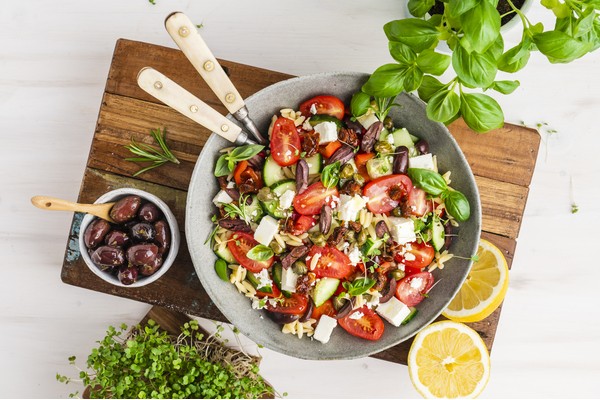In salads, cooking pots or ovens - olive oil represents Mediterranean culinary pleasure in the kitchen. The green gold not only complements other foods but also tastes exquisite on its own. In the following, we reveal what the widespread trend of drinking a tablespoon of olive oil every day is all about.

Description: Olive oil is not only good for cooking, but also for drinking.
What are the benefits of drinking olive oil?
In the Mediterranean region, olives have a long, long tradition. Even the ancient Greeks swore by the healing power of olive oil and used it for both treatment and prevention of diseases. By now, the health benefits of olive oil have spread worldwide. Even some celebrities have recently announced that they regularly drink olive oil pure. The following are the advantages of the "unadulterated" enjoyment of olive oil:
- Healthy fats: Olive oil is mainly made up of monounsaturated fatty acids, making it an excellent alternative to saturated (animal) fats.
- Natural health boost: Regular consumption of olive oil provides the body with large amounts of antioxidants and vitamins, which can reduce the risk of inflammation, cardiovascular disease, and even cancer.
- Weight loss: The intake of olive oil is said to reduce appetite and help with weight loss.
- Cosmetics: Olive oil is beneficial for both skin and hair.
- Digestion: Drinking olive oil is said to counteract constipation.
Drinking olive oil: What to consider!
To get the most out of the olive oil cure, some basics need to be internalized:
How much olive oil can you drink per day?
It is generally recommended to consume a maximum of two to three tablespoons of oil per day. Tip: Those who rely on healthy unsaturated fats can exceed this value from time to time with a clear conscience.
Naturally, a large portion of the recommended average daily dose is already taken in through regular food intake. Therefore, it is advisable to drink about one tablespoon of olive oil per day for a balanced diet. With larger quantities, the consumption of olive oil can also make a noticeable impact on the hips since olive oil has a high-calorie content.
Drink olive oil in the morning or evening?
There are various answers to the question of whether olive oil should be drunk in the morning or evening. Some are firmly convinced that taking it every evening leads to better sleep. Others claim that one tablespoon of olive oil in the morning ensures the perfect start to the day.
However, most approaches have one thing in common: Taking it on an empty stomach gives the olive oil the chance to unfold its effect optimally. So, if the intake takes place in the evening, it is recommended to stop eating about an hour beforehand. Ultimately, everyone has to find out for themselves what is best for their body.
Which olive oil is suitable for drinking?
Choosing any olive oil for drinking is highly unlikely to achieve the desired health result. Because not all olive oils are the same. The supermarket shelves are full of oil blends and refined products. Those who really want to do something good for their body should, therefore, scrutinize the label of potential candidates very carefully. The following criteria play a central role in buying olive oil:
- (Extra) virgin: The small but decisive word "virgin" means that an olive oil has been mechanically extracted, free of chemical solvents, and directly from the (stone) fruit. Synonyms for "virgin" can be found on the labels, such as "virgen" in Spanish or "vergine" in Italian.
- Grade I and II: Grade II olive oil is virgin olive oil, while Grade I includes extra virgin olive oil - the king of olive oils.
- Cold-pressed: Cold-pressed olive oils are suitable for drinking as they are produced at a gentle temperature in a closed system, preserving as many naturally healthy ingredients as possible.
- Organic: A certified organic label on the label guarantees natural production without chemical pest control.
In addition, polyphenol-rich olive oils are of particular relevance. Polyphenols are secondary plant substances found in the outer layer of the olive. The polyphenol content in olive oil depends on the type of olive, harvest time, processing, and storage. Olive oils that contain 5 mg (or more) of polyphenols per 20 g of oil not only have a unique fruity-bitter taste but are also officially considered health-promoting. When consumed regularly, they protect the body's cells from oxidative stress.
















